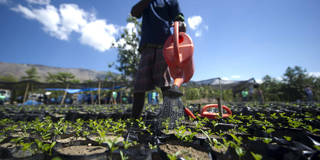Today, many policy proposals are immediately identified as either “left-wing” or “right-wing," leaving little room for discussion. But there is a way to bypass such divisiveness: trusting cost-benefit analysis to identify the policies and investments that would have the biggest positive impact on society.
PORT AU PRINCE – A sad reality of this hyper-partisan, politicized era is that many policy proposals are immediately identified as either “left-wing” or “right-wing” and lauded and derided by partisans as if by rote, with little room for discussion about soundness or impact. But there is an alternative that could help us get past this political divisiveness: using data to help us focus on the policies and investments that would have the biggest positive impact on society.

PORT AU PRINCE – A sad reality of this hyper-partisan, politicized era is that many policy proposals are immediately identified as either “left-wing” or “right-wing” and lauded and derided by partisans as if by rote, with little room for discussion about soundness or impact. But there is an alternative that could help us get past this political divisiveness: using data to help us focus on the policies and investments that would have the biggest positive impact on society.